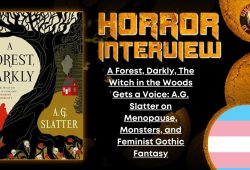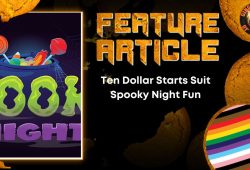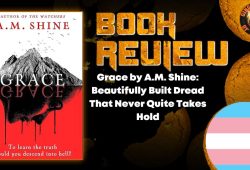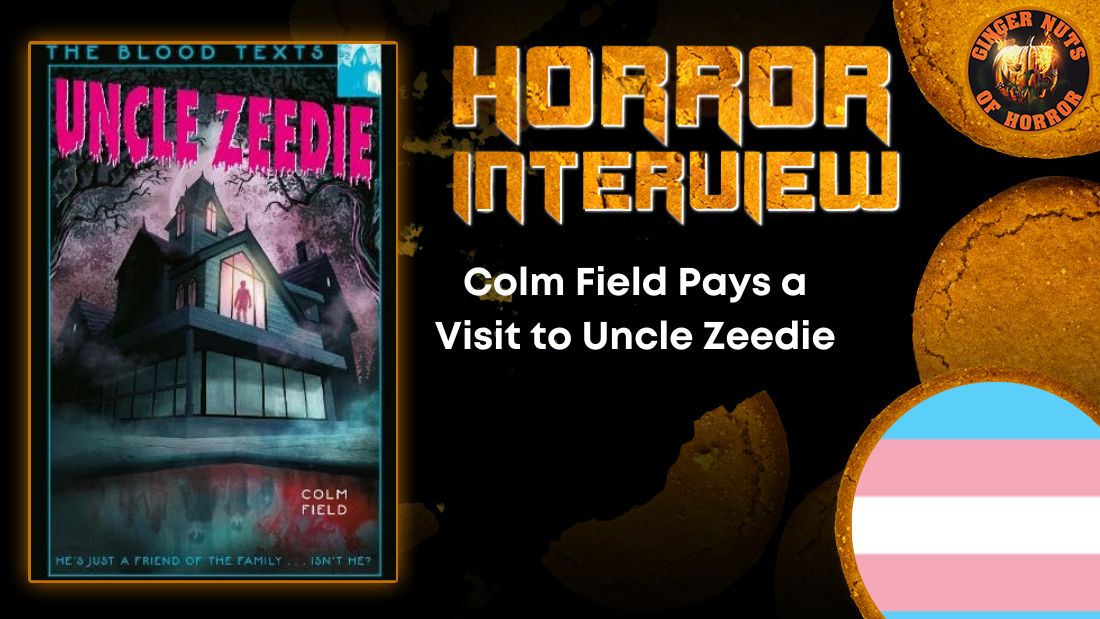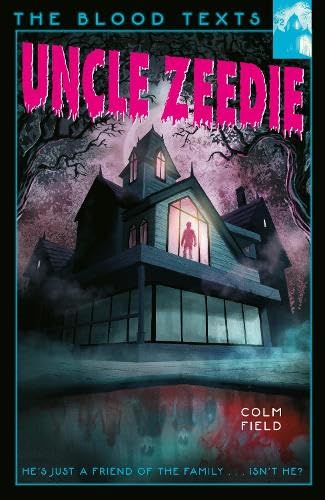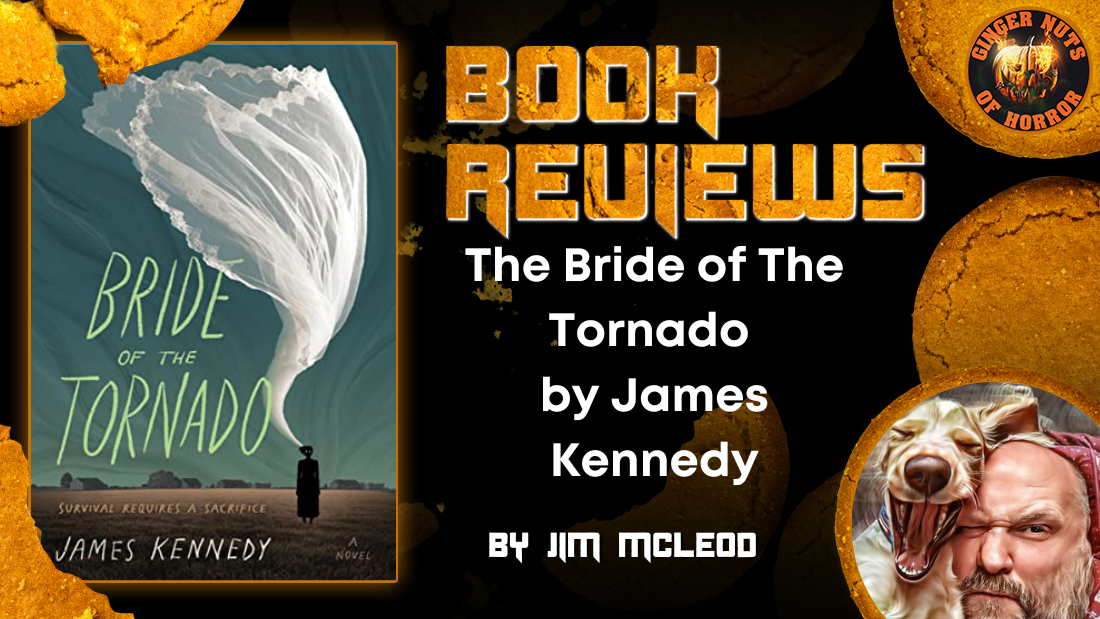Colm Field Pays a Visit to Uncle Zeedie
Please tell the readers a little bit about yourself.
I’m a big horror nut, who writes during every spare interval from a day job in construction and my three kids. Fortunately I write a big chunk of my books (and this interview) on my phone, which opens up hours of travel time / down time / sitting-in-a-knackered-portaloo time to write and read.
Which one of your characters would you least like to meet in real life?
I shan’t say whether I’d like to meet Uncle Zeedie, as that would answer the central question of the book. So instead I’ll look back to the first Blood Text; You’d Better Watch Out. There’s a psychotic Christmas elf in that story. He’s called the Itku Henki, he does interesting things with potato peelers, and he’d have me up on the naughty list before you could say “fare-dodged throughout his twenties.”
Which of your characters is your favourite?
The two protagonists of Uncle Zeedie, George and Lacey. They’re both very different, and argue a lot, but understand each other in a way only siblings can.
Which of your books best represents you?
Uncle Zeedie definitely contains much of my own life and memories. Admittedly more in that sense of teenaged discomfiture, not so much ‘I suspected a family friend of being a serial killer’.
In terms of my own family life for the past fifteen years, my first book Kyan Green mirrors a lot of that. It’s a middle grade sci-fi adventure, but the family at the heart of it are always scrabbling for the rent, and shouting and laughing and playing Just Dance because their dad won’t shuddup about the game.
Other than the horror genre, what else has significantly influenced your writing?
Being regularly skint, my family, and constantly jumping across different social circles thatsometimes seem a million miles apart. Oh, and THOUSANDS of authors.
The term horror, especially when applied to fiction, always has such heavy connotations. What’s your feeling on the term “horror”, and what do you think we can do to break past these assumptions?
In honesty, I always liked the term myself, as during those years when I wasn’t so keen to read (or at least be seen reading), it guaranteed a particular type of thrill ride that I still loved. Even now, when I’m knackered, there’s a particular type of shlocky story that I’ll be all over like damp moss.
That having been said, I know some people still get Satanic Panic eyes the moment anyone mentions horror. The genre could do with more literary respect at times, especially when you’ve had authors like Victor Lavalle and Catriona Ward and T. Kingfisher use discomfort, distaste and dread to expand our minds so.
Should horror be political?
It can be, but I won’t moan if it ain’t.
Why do you think so many people enjoy horror?
It’s the tension, innit. Sometimes it makes us look at ourselves in a way we wouldn’t necessarily want to without a blood-spattered clown to distract us. Sometimes you just want a blood-spattered clown.
What, if anything, is currently missing from the horror genre?
I’ve probably just not missed them, but it feels like there are less of those stories in which grim horrors happen to a host of soap opera-like relatable characters in a small Anytown USA (or UK).
What new and upcoming authors should we take notice of?
I recently read a book called Deadstream by Mar Romasco-Moore that was MEGA, really creepy and at the same time eye-opening. And I’m guessing T. Kingfisher is popular enough already not to need a shoutout, but I really do like her writing.
And who would be on your Mount Rushmore of horror?
Stephen King, obvs. Shirley Jackson too. Hmm, I’d have to get back to you on that though, else I’ll add everyone and it’ll wind up being a Terracotta Army of horror.
Are there any reviews of your work, positive or negative, that have stayed with you?
They all do in their own way, but maybe not in the way the reviewer intends. I once had an editorial note describe a term I’d used as problematic – it was a helpful note and I changedthe term, but it also got me thinking about the word ‘problematic’ and how it might be weaponised by someone with malevolent intent. Likewise, another book got SLATED by a reviewer for its slang, and that’s had me working on another idea around ‘proper’ English and the tyranny of Received Pronunciation.
What aspects of writing do you find the most difficult?
First drafts, although my planning has improved, which makes it easier to complete them. I love redrafting.
Does writing energize or exhaust you?
It does different things at different times really. First thing in the morning on the train or the bus it’s a rush to write, no matter how tired I am. Later on, during my tea break (like now) it’s a bit frenetic, as I’ll have to get back on the tools soon. Then on the way home there’s about half an hour where keeping my eyes open is a mish and my words loll about like drunkards. Then, if I fight through it, writing gets me going again. It’s like a really, really, really good addiction; there’s very few days where I’ll write nothing at all.
What’s your best advice for new authors about social media?
I’ve got none as they’d likely be better at it than me (@colmthewriter – like and subscribe!). It’s not something I particularly love or loathe, social media, but any time spent doing it is time you’re not writing a book.
How do you balance making demands on the reader with taking care of the reader?
Is this in terms of accessibility? If so then I definitely lean towards taking care of them, as I’m not after a Booker prize and there’s a fine line between cleverness and pretention. That’s got nothing to do with the themes of the book though. This is horror mate. Buck up.
Writing is not a static process; how have you developed as a writer?
Definitely through my planning. I’ve been lucky enough to get some ‘bread and butter’ type deals, the kind where you have to finish x-thousand words before a tight deadline. There’s no time to be precious or foggy, both sins I was probably guilty of back in the day.
What’s the most surprising thing you learned while writing your books?
Some time before writing Uncle Zeedie, I came across a claim that the smell of sour milk has been note in many serial killer cases throughout history. Whether this is true or not, the idea itself stuck in my mind; that one smell of decay could serve as a marker for some more sinister rot. And yes, I am aware that if you’re spending all your time out and about committing heinous acts then you might just be more likely to forget to chuck the milk out, but I had to use it all the same.
What does literary success look like to you?
In the longer term it’s all very materialistic I’m afraid. Being able to cut back further on building work, buying a flat; turning down dinner party invites from media types in corduroy trousers whose houses I once worked on…
But in honesty I’ll be happy so long as I keep getting asked to write.
What is the best piece of advice you ever received regarding your writing?
1) Write every day without fail
2) Enter the scene late, leave it early.
Do you have a favourite line or passage from your work, and would you like to share it with us?
‘The swimming pool was a complete change from the small overcrowded squares of wee George always dreaded on their usual holidays.’
Can you tell us about your last book, and can you tell us about what you are working on next?
I recently wrote a short story for Big Cat at Collins that I hugely enjoyed, and am putting the finishing touches on a very sweary comedy fantasy. Next up, I’m working on more teen horrors – one about evil boys, one about rats, and one that’s a bit like Traitors.
If you could erase one horror cliché, what would be your choice?
I mean, they’re not always horrors, but I could live without reading any more stories about people being unhappy in prestigious boarding schools.
If your partner was going to leave you for another author, which author would you like them toend up with and why?
Flippin heck, that’s some question! I don’t suppose you should say Richard Klinkhamer or Nancy Crampton Brophy, or anyone like that. So I won’t.
What’s the one question you wish you would get asked but never do? And what would be the answer?
I take my books around a lot of schools, and while the teachers are generally very sincere in their wish for their students to write more and not think of writing as some kind of gentleperson’s pursuit, I wish more questions would come up about how you’re supposed to survive and thrive until (and usually after) you start getting paid. For which my answer would be, get a job that’s not on a screen, and write on your phone – though I’m aware mine isn’t the only choice.
Don’t go away though, there’s lots of questions I wish I’d been given honest answers to before all this started.
Should I send my MS to one agent or publisher at a time? No, they take months to respond!
Is it a bad sign if my editor leaves my publisher? Yes – it doesn’t have to spell doom, but you’ve lost the person whose career is most closely tied to yours!
Should I let what’s popular influence what I write? Definitely, that’s what’s selling the most – don’t be a sheep, but if you can’t picture anyone you know sitting down to read your masterpiece then don’t assume anyone you don’t know will!
Okay, that’s all we’ve time for, many thanks for– Noooo! You can’t leave, you complete me! You complete meeeeee!…..
(The deranged screams fade into the distance as the interviewer hurriedly walks away…)
Blood Texts 2: Uncle Zeedie by Colm Field
Uncle Zeedie – From the blood curdling Blood Texts anthology series comes this supernatural teen thriller that will keep you guessing throughout.
Friend of the family… Or serial killer?
Uncle Zeedie is weird, but at least he’s rich and his house is amazing. That’s what George and Lacey tell themselves when they arrive at his isolated mansion in the Welsh woods. Only something here is worse than weird. Uncle Zeedie seems unhinged, serving them rotten food, and skulking around at night. The house is decaying, blood stained, and stinks of sour milk. And George is seeing kids that aren’t there. They’re dead, these kids. And if the rumours are right, Uncle Zeedie is the one who’s killing them. Cover illustration by Keith Robinson.
Praise For Blood Texts:
‘I thoroughly enjoyed every dark and menacing moment!’ Dan Smith, author of Red Winter and The Darkest Heart
‘…filled with suspense and excitement, perfect for those who love a good mystery…’ T Bailey (Toppsta Reviews)
‘…we have really enjoyed it in school and we already have a reserve list for it…’ Bryn’s Bookworms (Toppsta Reviews)
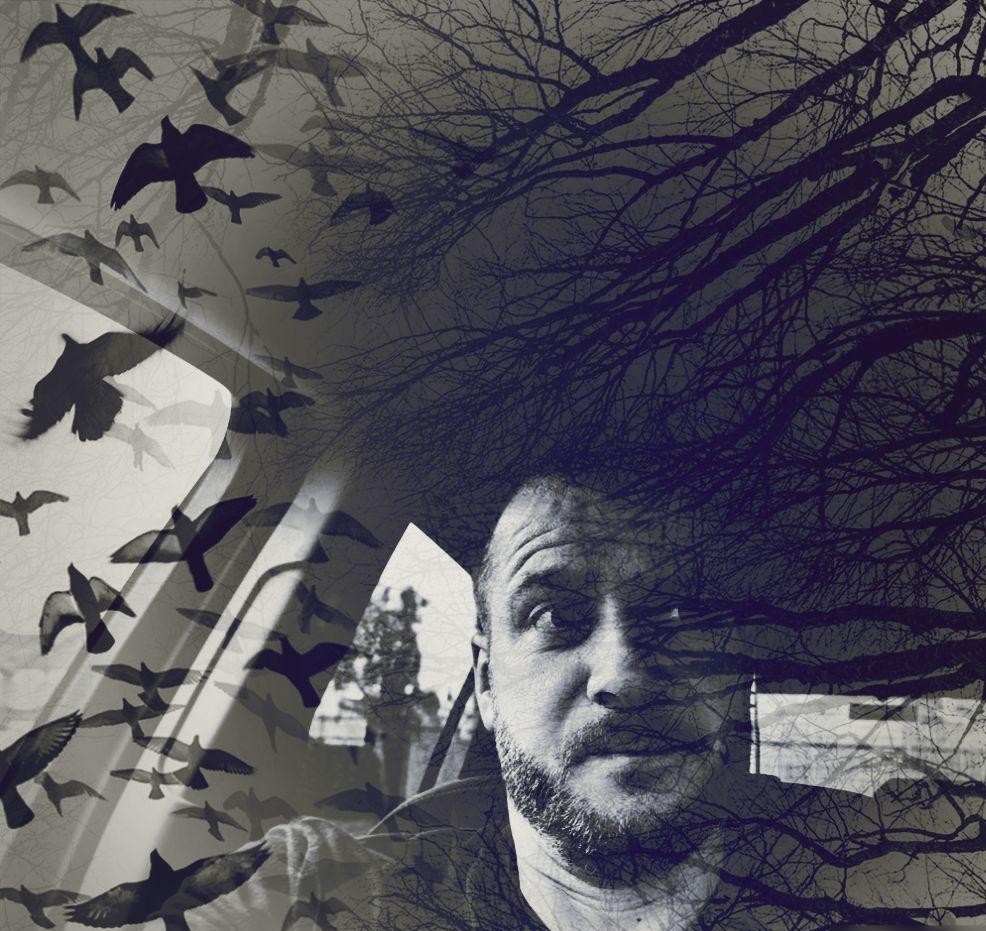
Who is Colm Field? Well, he was born in the witching hour, beneath a blood-red moon, and under a bad sign. His first words were not fit to print. Now he scratches stories with yellowed fingernails, across the mouldering walls of the abandoned nuclear power station he calls home. If you like what you read, we’ll dare you to find out more…
In terms of links, Colm’s Instagram is probably the best bet – https://www.instagram.com/colmthewriter
He also has a website, https://www.colmthewriter.com/
Further Reading
If you’re a fan of horror literature and cinema, then you absolutely need to check out the horror interview section of Ginger Nuts of Horror.
Firstly, the interviews feature a diverse range of authors, filmmakers, and horror enthusiasts, allowing readers to gain a multifaceted understanding of the genre. Each interview is an opportunity to explore the creative processes, inspirations, and personal stories behind the minds that produce some of the most chilling and thought-provoking works in horror today. From seasoned veterans to up-and-coming talents, the variety of voices ensures that readers can find something that resonates with them.
Moreover, these interviews often delve into the nuances of what makes horror such a compelling genre. Contributors share their thoughts on the psychological aspects of fear, the societal influences on horror trends, and the ways in which horror reflects cultural anxieties. This deeper exploration not only enriches one’s appreciation for horror stories but also fosters discussions about broader themes, such as identity, morality, and existential dread.
The interviews frequently touch on practical advice and industry insights. Writers and creators often share the hurdles they faced in their careers, tips for aspiring horror writers, and the realities of getting published or produced. This wealth of knowledge is invaluable for anyone looking to navigate the sometimes challenging waters of the horror genre. Readers interested in breaking into horror writing or filmmaking will find a treasure trove of wisdom that could pave their path toward success.
Lastly, the community aspect of Ginger Nuts of Horror cannot be overlooked. Engaging with these interviews allows readers to feel connected to a larger community of horror enthusiasts. Comment sections and social media interactions often follow, enabling fans to discuss their thoughts and engage with both the interviewees and fellow readers.
In conclusion, the horror interview section of Ginger Nuts of Horror is an essential resource for anyone interested in the genre. It provides rich insights, guidance, and inspiration that can deepen one’s appreciation for horror while fostering a vibrant community among fans and creators alike. Don’t miss out on the chance to delve into the minds of your favorite horror creators!




